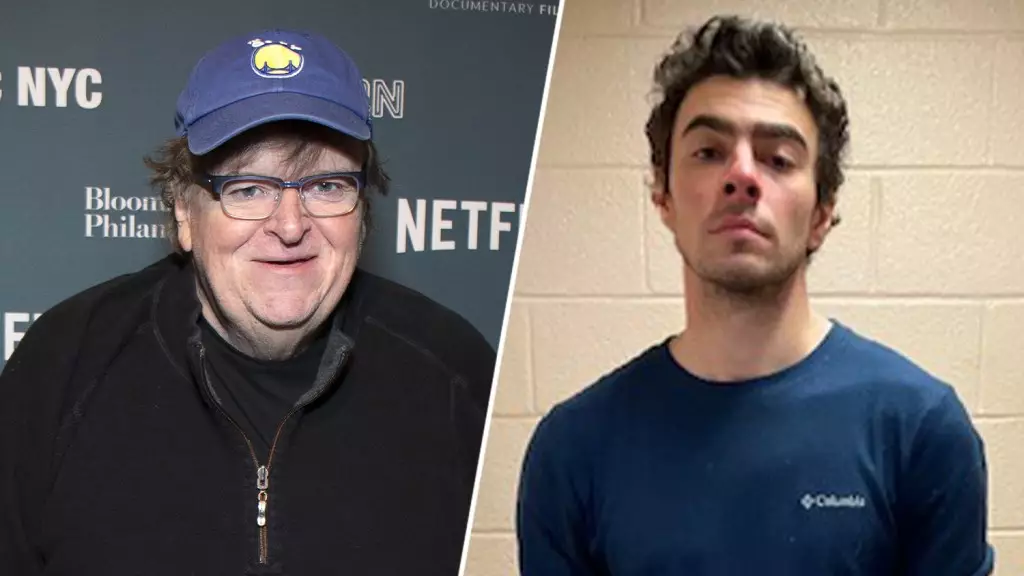The recent murder of Brian Thompson, CEO of UnitedHealthcare, has sparked a whirlwind of emotions and conversations around the grim realities of America’s healthcare system. With the arrest of Luigi Mangione, the suspected perpetrator, attention has turned not only to the violence itself but also to the circumstances that foster such extreme reactions. Filmmaker Michael Moore’s open letter in response to Mangione’s manifesto offers a critical insight into the broader societal sentiments surrounding this tragic event.
Moore begins his letter with a straightforward declaration: he vehemently condemns murder. However, his intent is not to shy away from the attendant anger that has emerged following Thompson’s death. This anger, according to Moore, is deeply rooted in the systemic issues plaguing the healthcare industry, particularly the for-profit model that prioritizes profits over patient care and well-being. The filmmaker’s remarks create a stark juxtaposition against the backdrop of violence, emphasizing that the emotional turmoil stems from decades of perceived injustices and mismanagement in American healthcare.
Thompson’s murder has unearthed a torrent of rage directed at the health insurance industry, a sentiment Moore argues is entirely warranted. Anger, he asserts, is not a spontaneous reaction to one man’s death; it’s an acknowledgment of the countless lives affected by a system that seems to put financial gain above human health. The phrase “pour gasoline on that anger” serves as a provocative rallying cry, suggesting that the frustrations are neither fleeting nor misplaced but rather indicative of a far-reaching catastrophe.
This perspective posits that the outrage is deeply interconnected with the ongoing plight of millions of Americans struggling under the weight of exorbitant medical costs, denied coverage, and the fear of financial ruin due to medical bills. In this sense, Thompson’s death symbolizes not an isolated incident but rather the tipping point of a broader crisis that has long been simmering beneath the surface. Moore’s belief that “the anger is 1000% justified” challenges conventional narratives surrounding violence and misdirected frustrations.
While acknowledging the legitimacy of the anger, Moore does not endorse violence as a vehicle for change. He characterizes Mangione’s actions as a form of “rich-on-rich crime,” distancing the public outcry from the motivations that led to a tragic act of violence originating from a privileged socioeconomic background. The tension here lies in the recognition that the solution to healthcare grievances must not veer into the realm of justifying violent actions. Instead, Moore calls for constructive dialogue around the necessary reforms needed in the healthcare industry, emphasizing that no one should suffer or die due to issues with health insurance.
It’s a complex juxtaposition: the need to vocalize frustrations and advocate for systemic change without crossing the line into justifications for violence. Moore’s nuanced stance encapsulates a struggle faced by many in advocating for justice in a fundamentally broken system. His passionate insistence that the solution lies in universal access to healthcare shines a light on ethical considerations, pushing back against a narrative that might ignore the sanctity of life while wrestling with the call for accountability.
A Call to Action
In concluding his letter, Moore shares a link to “Sicko,” his documentary chronicling the healthcare crisis in the United States. This act serves as both an invitation for reflection and an encouragement to engage with the issues at hand on a deeper level. By questioning the structures that label healthcare as a commodity rather than a basic right, his work calls attention to the urgent need for reform.
The letter sheds light on a profound societal issue that resonates beyond the scope of Thompson’s murder. Moore’s passionate analysis offers a glimpse into a widespread struggle—finding voice and solace in outrage when confronted with systematic inequities that affect the lives of so many. The challenge, ultimately, is to channel this anger into meaningful action that addresses the core issues of healthcare, ensuring that the tragedy of one individual does not overshadow the broader context of suffering for countless others.


Leave a Reply